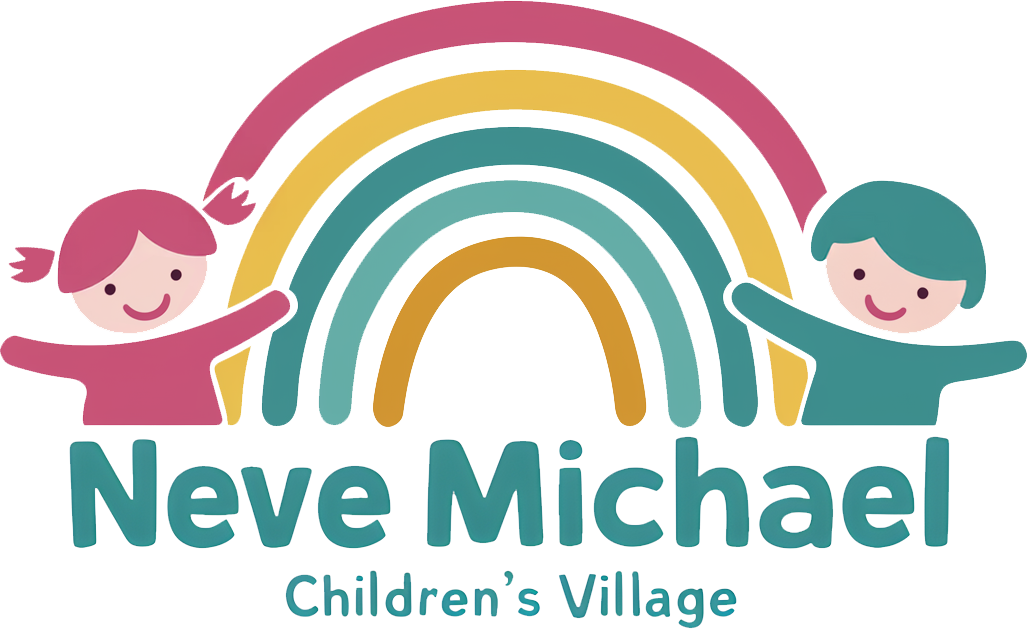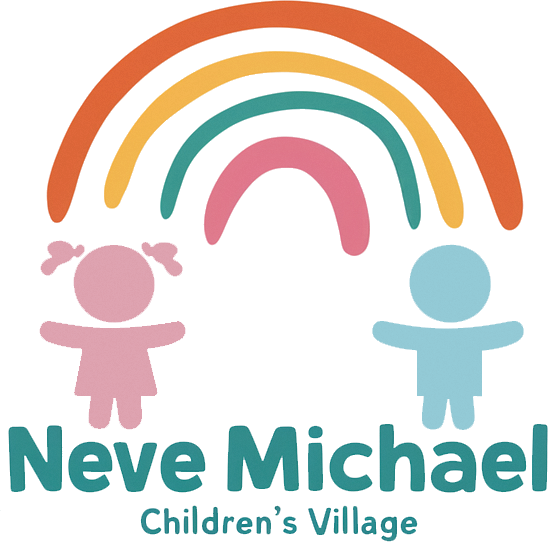Aside from providing a home with clean beds, love and care, The Neve Michael Children’s Village is also home to many on-site facilities…
[/vc_column_text][vc_column_text css_animation=”appear”]- Family Homes which provide a sense of normalcy (Including Jusidman Family Homes – Beit Hermon and Beit Carmel)
- The Children’s Emergency Crisis Center provides immediate 24/7 refuge for a child at risk
- The first and only Jusidman Teenage Girls’ Crisis Center in Israel that provides a safe place for teenage girls at risk.
- The Jusidman Special Education Elementary School on the premises
- A Therapy Enrichment Center tailored to meet the individual needs of the children
- An External Crisis Center
- Therapy Counseling Unit which helps keep families at risk in tact
- Day Care facility that also serves disadvantaged children in the area.
Our Campus is a safe haven for so many children who cross our threshold and who have gone on to succeed in life. The Therapy Enrichment Center provides tailored programs to meet the individual needs of the children.[/vc_column_text][/vc_column][/vc_row][vc_row row_id=”page_facillities_content” css=”.vc_custom_1504690932204{background-color: #ffffff !important;}”][vc_column][vc_tta_accordion][vc_tta_section title=”FAMILY HOMES” tab_id=”1496835134181-cc7fc32b-723a”][vc_column_text css_animation=”appear”]Family Homes in the children’s village, consist of a married couple with their biological children who live with a number of children from the village. The Family Home provides a home-like atmosphere for the children, meeting their physical, emotional, therapeutic and educational needs and enabling them to have positive role models as “parents” and to experience living in a family framework.
The housemother and National Service girls are in charge of providing the children at risk with a functional, daily routine of getting up for school, eating breakfast, supervising that backpacks are ready for school, making sure they go to the main dining room for a hot lunch, assisting them with their homework, making sure the children go to afternoon extracurricular activities and therapies, preparing dinner and helping them to prepare for bed.[/vc_column_text][/vc_tta_section][vc_tta_section title=”CHILDREN’S EMERGENCY CRISIS CENTER” tab_id=”1496835134286-d32ffa20-96e2″][vc_column_text]The doors to our 24-Hour Children’s Emergency Crisis Center opened in August 2000 with the assistance of the JDC and private donors.
Yes, such atrocities happen here in Israel. Some children arrive with cigarette burns on their tender, young skin. Others have endured horrible experiences. For example one little boy, saw his drug-addicted father kill his mother while under the influence. Children from all over the country who need to be removed immediately from their home and surroundings are referred to us through the Welfare Department and arrive at our Emergency Crisis Center, 24 hours a day, seven days a week. Despite major government budget cuts, our devoted staff works continuously to treat our children. These children are in constant need of professional therapy and diagnostic testing.
It is our objective to help our children break the vicious cycle of distress. Each child responds differently to the various treatments available. Therefore, we try to find the best way to reach into the souls of our children.
These children all come with “psychological ghosts” from their past. Some remember many frightening nights when they lay awake wondering if their father would forcefully join them in bed, or if their parents were too high to notice that they were sick with fever. They arrive with various stress disorders – whether it’s general anxiety, nightmares, misbehaving, depression, sleeplessness, bedwetting, physical complaints, and other trauma-inflicted mental disorders.
The children are referred to Neve Michael through the Welfare Department. The population coming from poverty stricken areas, low social-economic level, and most families have been supported by the Welfare Department through many generations. Most parents were raised in public homes and the majority do not work or function in a normal society.
Most children, who arrive at our Emergency Crisis Center, cannot return home. They are here through holidays and summer vacations. We strive to make an immense difference in the lives of these children. We cannot change the hurtful past for our children. But, together, we can promise to give them a better future.[/vc_column_text][vc_btn title=”Download PDF” color=”violet” link=”url:http%3A%2F%2Fnevemichael.wpengine.com%2Fwp-content%2Fuploads%2FEmergency.pdf||target:%20_blank|”][/vc_tta_section][vc_tta_section title=”TEENAGE GIRLS EMERGENCY CRISIS CENTER” tab_id=”1496835199458-c5b6bd3a-d9ce”][vc_column_text]Neve Michael’s Teenage Girls’ Emergency Crisis Center is the first and only of its kind in Israel. Israel’s Welfare Department refers teenage girls 13 to 18 years old, who suffer extreme mental, physical and/or sexual abuse, or who are in emotional distress.
For Revital, a 15-year-old girl, this is the ray of hope she so desperately needs. At the end of October 2009, she arrived at the doorstep of the first Teen Girls’ Crisis Center in Israel at Emunah’s Neve Michael Children’s Village. Revital was accompanied by a police officer and a social worker after being dragged from the streets of Jerusalem, where she was prostituting herself, mostly in Arab neighborhoods.
After many hours of therapy, the professional staff discovered that Revital had been sexually abused when she was 5 years old by a family member, who is now deceased. Revital’s family was not able to prevent the consequent deterioration in their only daughter’s life.
Now, they are not alone.
• The Teen Girls’ Crisis Center serves teenager girls nationwide from the age of 13-18 years old who have suffered mental/physical abuse or who are in emotional distress due to various causes.
• Only acute situations of teenage girls at risk are referred to the Center by the Welfare Department.
• An important component for the success of the Teenage Girls’ Crisis Center is the family intervention program.
• We expect 40-50 teenage girls annually.
• The professional staff evaluates each teenager that arrives and plans an individual treatment program for her.
• It is important to analyze the source of distress for each teenager and to reach her before she turns to substance abuse to dim the pain or decides to put an end to her own life.
• Our objective is to build self-sufficiency in the teenagers, so that they will be able to cope with life’s challenges as mentally healthy adults.
• The treatment and evaluation is performed by professional experts, psychologists and social workers.
• The anticipated timeline is flexible and dependent on a particular individual’s progress, but we expect each treatment to take from several months to approximately two years.
• The Neve Michael staff works in conjunction with the Child Welfare Department of the Ministry of Welfare.[/vc_column_text][/vc_tta_section][/vc_tta_accordion][/vc_column][/vc_row][vc_row row_id=”page_facillities_content” css=”.vc_custom_1504691547620{margin-top: 0px !important;margin-bottom: 0px !important;padding-top: 0px !important;padding-bottom: 0px !important;background-color: #ffffff !important;}”][vc_column][vc_separator border_width=”2″][vc_column_text alignment=”center” css=”.vc_custom_1683788201867{margin-bottom: 0px !important;padding-bottom: 0px !important;}”]
Jusidman Elementary School | Therapy Enrichment Center | Children’s Emergency Crisis Center | Jusidman Teenage Girls’ Emergency Crisis Center | 12 Family Units | Day-Care facility | Synagogue | Cafeteria/auditorium | Administrative Offices
[/vc_column_text][/vc_column][/vc_row][vc_row css=”.vc_custom_1504691482061{background-color: #f7f7f7 !important;}”][vc_column][vcsp_block_title el_type=”vcsp_section_title” alignment=”center” css_animation=”appear”]Campus Photos[/vcsp_block_title][vc_row_inner][vc_column_inner width=”1/4″][vcfastgallery fg_gallery_name_show=”true” fg_type=”fotorama” fg_main_color=”#fc615d” fg_secondary_color=”#ffffff” fg_gallery_name=”The Synagogue” images=”2930,2931,2932,2933,2934″][/vc_column_inner][vc_column_inner width=”1/4″][vcfastgallery fg_gallery_name_show=”true” fg_type=”fotorama” fg_main_color=”#fc615d” fg_secondary_color=”#ffffff” fg_gallery_name=”The School” images=”2926,2927,2928,2929″][/vc_column_inner][vc_column_inner width=”1/4″][vcfastgallery fg_gallery_name_show=”true” fg_type=”fotorama” fg_main_color=”#fc615d” fg_secondary_color=”#ffffff” fg_gallery_name=”The Giraffe House” images=”2922,2923,2924,2925″][/vc_column_inner][vc_column_inner width=”1/4″][vcfastgallery fg_gallery_name_show=”true” fg_type=”fotorama” fg_main_color=”#fc615d” fg_secondary_color=”#ffffff” fg_gallery_name=”Other Campus” images=”2913,2914,2915,2916,2917,2918,2919,2920,2921″][/vc_column_inner][/vc_row_inner][vc_empty_space height=”60px”][/vc_column][/vc_row][vc_row equal_height=”yes” row_id=”page_about_us_mission” css=”.vc_custom_1504689829813{background: #f7f7f7 url(http://nevemichael.wpengine.com/wp-content/uploads/about-bg-papirus.png) !important;background-position: center !important;background-repeat: no-repeat !important;background-size: cover !important;}”][vc_column el_class=”col_left”][vcsp_block_title css_animation=”appear” el_class=”_title”]Our Mission[/vcsp_block_title][vc_column_text css_animation=”appear” columns=”two_columns”] Located in Pardes Hanna, Israel, Neve Michael truly is a haven, serving at-risk children ages 5-18 years old from all over Israel. Some of these children are brought to Neve Michael’s doorstep at a tender age and under traumatic circumstances. Some have suffered mental, physical, and/or sexual abuse. In many cases, the parents of these children are afflicted with a mental illness or drug and alcohol addictions.
Located in Pardes Hanna, Israel, Neve Michael truly is a haven, serving at-risk children ages 5-18 years old from all over Israel. Some of these children are brought to Neve Michael’s doorstep at a tender age and under traumatic circumstances. Some have suffered mental, physical, and/or sexual abuse. In many cases, the parents of these children are afflicted with a mental illness or drug and alcohol addictions.
This is where the Children’s Village comes in. The Neve Michael Children’s Village is the only multidisciplinary children’s home in Israel which houses facilities on-site such as Family Homes, a 24-hour Emergency Crisis Center, and the first teen Girls Crisis Center in Israel. Our programs are also on-site, making a daily routine easy to manage.
More importantly, these children come to Neve Michael feeling afraid and alone. We provide Family Homes in the children’s village, which consist of a married couple with their biological children who live with a group of children from the village. We provide a home-like atmosphere for the children, meeting their physical, emotional, therapeutic and educational needs and enabling them to have positive role models as “parents” and to experience living in a family framework.
The housemother or housefather, and National Service girls, are in charge of providing the at-risk children with a functional, daily routine of getting up and ready for school, eating breakfast, making sure they go to the main dining room for a hot lunch, assisting them with their homework, making sure the children go to afternoon extracurricular activities and therapies, preparing dinner and helping them to prepare for bed.[/vc_column_text][vc_empty_space][/vc_column][/vc_row][vc_row row_id=”page_about_us_history” css=”.vc_custom_1500644765469{background-color: #f7f7f7 !important;}”][vc_column][vc_column_text css_animation=”appear” el_class=”_title”]
Brief History – Neve Michael – Then and Now
[/vc_column_text][vc_column_text css_animation=”appear”] A momentous event for the emerging Jewish yishuv in Eretz Yisrael took place in April 1943 with the opening of the first public religious institute for children from the age of 3-6 at Bet Hayeled (A Child’s Home) in Pardes Hanna. Our Home was founded by the Mizrachi Women’s Histadrut Federation of America and the local Hapoel Hamizrachi Operators Council. Initially, the Home absorbed 25 children, among them: 10 children of Hagana recruits, 10 children from Teheran and 5 children who were separated from their families.
A momentous event for the emerging Jewish yishuv in Eretz Yisrael took place in April 1943 with the opening of the first public religious institute for children from the age of 3-6 at Bet Hayeled (A Child’s Home) in Pardes Hanna. Our Home was founded by the Mizrachi Women’s Histadrut Federation of America and the local Hapoel Hamizrachi Operators Council. Initially, the Home absorbed 25 children, among them: 10 children of Hagana recruits, 10 children from Teheran and 5 children who were separated from their families.
Though the facilities had a limited amount of absorption space which couldn’t receive all those children in need of day care and a roof over their heads, there was an overriding sense that a vital and timely step had been taken, the first of its kind in the pre-state yishuv.
The institute’s management group did not spare any efforts to create a safe haven for those first children who were brought through our gates. Lots of thought, love and dedication was invested in every piece of furniture and child’s toy, as well as all the work tools and kitchen utensils. The imposing Home and the garden, fruit trees and ornamental trees surrounding it spread over 5 dunams, which gave the impression of a palace for children immersed in green and flowers.
The Home’s many unique qualities and the strong will of the management and staff offered hope for each child who was separated from his family in those dark years in our history.
Shortly after the establishment of the State of Israel, our Home was visited by Jakob Michael, a prominent Jewish industrialist and philanthropist. He and his wife Erna were enchanted with Beit Hayeled, its pastoral surroundings and mostly by the children who were growing up in a warm, loving and safe environment. They wouldn’t leave the premises without leaving a most generous gift, for which we named our Home for them: the Neve Michael Children’s Home. Now, many years later, the name is still appropriate, both in recognition of our kind benefactor and with regard to the meanings of the Hebrew term “neve” – oasis, haven, and abode. For the many children who passed through our open gates, were nurtured in our Home and came out as vibrant young men and women, these meanings most surely apply.[/vc_column_text][vc_empty_space height=”60px”][/vc_column][/vc_row][vc_row vcsp_row_type=”row_footer” row_container=”vcsp_container_disabled” css=”.vc_custom_1496739790576{background-image: url(http://nevemichael.wpengine.com/wp-content/uploads/about-last-photo.jpg);background-size: cover !important;background-position: center !important;background-repeat: no-repeat !important;}”][vc_column][vc_column_text][donate_link] [/vc_column_text][vc_empty_space height=”600″ alignment=”” css_animation=”appear”][templatera id=”footer”][/vc_column][/vc_row]

